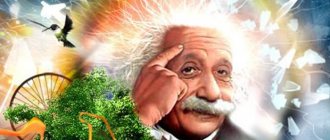The question of genius has been asked a long time ago, tried in many ways, discussed many times, many paths taken, and many answers given. However, no one has answered the question about its origins, its nature, structure, and, of course, the most exciting question: “Why him, and not me? After all, I..."
And, naturally, many of the same essays and research papers were written. Take, for example, Cesare Lombroso, who argued that genius is a relative and child of insanity. He made this conclusion based on phrenological portraits (nowadays, only psychologists or sorcerers can determine the personality, character and vices of a person, calling the rest arrogant upstarts).
However, in his work on this topic, “Genius and Madness,” the conclusions do not lie on a plateau of dubious statements bordering on mysticism or prejudices like “signs above the head”….
Brilliant people spend a lot of time thinking and imagining.
Imagination is the most powerful weapon of a genius - they always dared to dream and make their dreams come true. And that's why history still remembers them, hundreds of years after their deaths. One of the world's most important visionaries was Albert Einstein. He used the "visualization technique" in countless different ways. Einstein usually expressed himself in different ways, especially through diagrams. He said that if he had one hour left to save the world, he would spend 55 minutes thinking about how to do it, and the remaining 5 minutes would actually try to save it.
Alexander the Great: Creation of a New World
In world history there have been many commanders whose victories numbered in the dozens. Alexander defeated the army of the largest empire in several battles, took the most fortified cities of that time and reached Punjab. The empire he created collapsed a few decades after his death, but new states emerged from its fragments.
The King of Macedonia was obsessed with the idea of uniting the West and the East under his rule. The idea was partly a success. After his campaigns, the Mediterranean became a different world. The Greeks had served eastern rulers before. But now the heart of Greek civilization began to beat in Asia and Egypt. The Alexandria Museum became the greatest center of intellectual life - philosophers, scientists and poets from all over the Mediterranean lived here. The library contained the most important scientific works. Here the Old Testament was translated into Greek. Pergamon, whose library also became a scientific center, did not lag behind him.
Hellenism brought about revitalization and changes in Hellenic literature, sculpture and architecture. New traditions and ideas associated with Eastern influence appeared. Later, the Roman Republic would join this world, whose culture would be formed under the influence of the Hellenistic one.
Alexander was not directly involved in most of the processes. But it was his conquests that created a world in which the appearance of the Alexandrian Museum and the Pergamon Library was possible.
Geniuses always wake up very early
The early bird gets the worm - we've heard it said countless times, and with good reason, as most geniuses wake up very early in the morning. Most of them usually woke up around five or six in the morning; it rarely happened that a true genius woke up after seven. Ernest Hemingway, one of the most famous creative minds, was famous for his morning ritual - he would wake up very early and write. This is when he was most productive as no one disturbed him early in the morning and he could easily concentrate on his work.
Johann Sebastian Bach (1685-1750)
Johann Sebastian Bach is one of the greatest composers in history. He created “new music” by abandoning all the traditions of previous times. He went against the rules and showed the world new fusions of sounds, began to use hitherto forbidden intervals, and became a famous master of polyphony. Bach is the first Baroque composer. He gave the world more than 1000 works that were completely new in style.
Brilliant people love to walk
Walking is undoubtedly one of the best cardiovascular exercises you can choose. It exercises all your muscle groups and does not place unnecessary stress or pressure on your joints.
Apart from this, walking helps you relax and blow off steam, while fresh air helps you clear your mind - something the world's biggest geniuses and most valuable creative minds have learned! As mentioned above, Tchaikovsky used to walk for two hours every day, and it is believed that this small ritual played a very important role in his life. It increased his creativity, productivity, and mastery of creative tasks.
However, Tchaikovsky wasn't the only one who walked for two hours every day - Mahler and Beethoven are believed to have had the same habit.
What is genius?
So what is genius? A person’s special path chosen from above (as theologians say), his persistent work on himself, a genetic joke or a mistake? Or just a lucky coincidence of circumstances, after which just yesterday an ordinary person becomes a genius?
In my opinion, every person has genius to one degree or another. After all, even if being diversified, that is, being Leonard’s “Vitruvian Man” or “universal man” is difficult and sounds labor-intensive and complicated, how many people have a passion for one or another science, be it exact, natural, humanitarian or social?
How many have a passion for a particular science? By the way, it is precisely the fanatics of a particular scientific discipline who are usually recognized as “geniuses” in their field, while not possessing any outstanding intelligence or abilities, when ambition and luck played a large role in success.
From the above, we can assume that anyone, even the most ordinary person, a respectable citizen, is capable of being outstanding and brilliant in his field. But why then did “genius” become not an everyday word, but a rare one, a praise applied only to a few, very few? Although, perhaps, if people paid less attention to everything “socially correct”, such as family, work, money, prestige, fame, their own reputation - maybe then the number of geniuses (either geniuses or “stubborn”? ) would be significantly larger.
One way or another, I consider genius rather the excessive originality of a person, fitting within the framework of his time. Yes, of course, everyone is original, has their own unique appearance, destiny, thought, idea... but someone is a little more original than an ordinary original person, let’s say so. Ask: “What does time have to do with it?” And I will answer. Time determined the society in which the “original original” lives.
Genius - originality or evil fate?
Or rather, not even time, but social conditions, the material level of existence. Society determined the extent to which a genius could develop his potential. For example, you can imagine flying over the ground. An airplane, or any other aircraft. A person living in ancient times or in modern times, when minds were equally liberated, could speak about his ideas, thoughts and beliefs without fear and fear, without fear of being punished for it.
And, who knows, maybe flying machines would have appeared much earlier than we imagined. If the inventor had spoken about “machines of the future” in the 18th or 1st centuries AD, he would have been considered a genius, a beacon of reason, all that is good and beautiful, and the like. But if his words had reached the ears of the people of the harsh Middle Ages, then the infamous fate of being burned alive and scattered to the wind would not have been long in coming. And no, I am not criticizing the Middle Ages at all, since each time has its own characteristics. It’s just that Antiquity is the genius of materiality and oratory, and the Middle Ages is the genius of the soul and mind.
They stick to a simple routine—to the point of obsession!
If you had any preconceptions about the routine until now, then you may want to reconsider this. Brilliant people are known for creating a simple routine and sticking to it almost obsessively. This helps them take control of their lives and also gives them a sense of strength and security.
For many writers and artists, this simple routine is critical to their success, and they treat it as such. Tolstoy, for example, had a very detailed routine that included writing every day.
Salvador Dali (1904-1989)
The list of “The Most Talented People in the World” undoubtedly includes Salvador Dali. During his life, this Spanish genius managed to become a famous artist, an original director, a unique graphic artist, a sculptor and a writer. He is rightfully considered the most outstanding representative of surrealism. Looking at his works of art, you can easily break your head over thoughts of silhouettes, shapes, colors and subjects.
Salvador Dali is one of the unique geniuses that the world has never known. The most famous among his masterpieces are the paintings “Giraffe on Fire”, “Venus with Boxes”, “A Dream Inspired by the Flight of a Bee a Moment Before Awakening” and “The Persistence of Memory”. Salvador Dali wrote several autobiographies, the most famous of which is “The Diary of a Genius.”
They are able to work anywhere
Geniuses are known for their instability and versatility. Even if they have their own little rituals that they follow, they are able to work anywhere. They only need the bare essentials to help them express themselves. And when inspiration strikes, they can easily channel it in a very productive way, whether they are working in their home office or in the middle of nature.
Brilliant people are very adaptable and don't need special tuning to do what they need to do. For example, Agatha Christie could write anywhere without any problems. All she needs is a table on which her typewriter can sit.
Katsushika Hokusai (1760-1849)
Katsushika Hokusai also found his place among the most talented people in the world. This is one of the most prominent Chinese engravers and illustrators. During his life, he worked under more than 30 pseudonyms, which surpassed many of his colleagues. By his special unique style, anyone can distinguish his work from the rest. His most famous works are “The Great Wave off Kanagawa” and “Manga”. Modern art historians still call “Manga” an encyclopedia of Chinese life and consider it an invaluable cultural heritage.
When they run out of inspiration, they stop while their creative juices are still flowing
This is one of the aspects that makes the difference between ordinary people and geniuses. While ordinary people tend to stop working when they lack creative juice, geniuses have a fundamentally different approach. They stop when they still have ideas floating around in their head.
Brilliant people always know what the next step will be. And they never “drain their creative reservoir.” They always save a small idea for the future that will serve as a starting point for their next creative project.
Some of them worked only three hours a day, others six, or as many as twelve. For example, Mozart slept five to six hours a day and spent most of the day in music lessons and concerts.
- How to become a genius: some thoughts from Albert Einstein
Charlemagne: at the origins of modern Europe
After the slow decline of the Roman Empire in the west, Europe plunged into the darkness of the Early Middle Ages. The population has decreased: some regions have become depopulated. Several epidemics and destructive wars swept across Europe.
Even under these conditions, the heritage of Roman civilization and science was not forgotten. But the eras of the 5th - 8th centuries stand out as difficult and dark times. In 768, Charles, who went down in history under the nickname the Great, became king of the Frankish kingdom. He was a decisive sovereign who fought a lot with his neighbors and expanded the borders of the Frankish kingdom, and in 800 he was crowned emperor.
His empire included parts of eastern Spain, Italy to Rome, and the territory of modern Germany. Avars and numerous Slavic peoples were dependent on him: Moravians, Czechs, Obodrites, Serbs.
The emperor became famous not only for his victorious wars. He attracted educated people to his court and built schools. An Academy was organized, whose members were the smartest people of his era - the monk Alcuin, the historian Paul the Deacon, the biographer Einhard. Alcuin's student was the author of one of the medieval encyclopedias, Rabanus the Maurus.
Children of nobles and clergy studied in schools organized in the empire of Charlemagne. They studied the seven liberal arts, the canon of which had been formed earlier. "Carolingian minuscule", a method of writing letters that became the basis of the modern alphabet of most Western countries. At Charles's court there was an admiration for Roman literature, and copies of works in Latin were made.
The death of Charlemagne was followed by the collapse of his empire. The division of the empire into three states, formalized in 843, laid the foundations of modern Italy, Germany and France.
High IQ increases chances
A high level of intelligence can lead to bipolar affective disorder. This conclusion was reached by American researchers from Johns Hopkins Medical University, led by clinical psychologist Kay Redfilm Jamison. The large-scale experiment, which lasted 10 years, involved 700 thousand (!) teenagers aged 16 years.
At the first stage, scientists, during routine testing, determined the level of intelligence of the subjects; at the second, they determined which of the experiment participants developed a mental illness years later. The results of the work, published in 2010, shocked the public: teenagers with a high IQ level were four times more likely to become victims of bipolar affective disorder, which is characterized by sudden mood swings: from unreasonable happiness to black depression.
Nikita Khrushchev
This is a very controversial personality who influenced the course of history. His versatile nature is well demonstrated by the tombstone erected for him, which was simultaneously made of white and black stone. Khrushchev, on the one hand, was Stalin’s man, and on the other, a leader who tried to trample on the cult of personality. He began radical reforms that were supposed to completely change the bloody system, released millions of innocent prisoners from the camps, and pardoned hundreds of thousands of those sentenced to death. This period was even called the “thaw”, as persecution and terror ceased.
But Khrushchev did not know how to bring big things to the end, so his reforms can be called half-hearted. His lack of education made him a narrow-minded person, but his excellent intuition, natural common sense and political instincts helped him stay in the highest echelons of power for so long and find a way out in critical situations. It was thanks to Khrushchev that it was possible to avoid a nuclear war during the Cuban Missile Crisis, and also turn the bloodiest page in Russian history.
Marilyn Monroe (1926 - 1962)
Norma Jeane Mortenson is known throughout the world as Marilyn Monroe. During her unfortunately short life, this woman managed to win the hearts of millions and remain in the memory of her fans for many years to come. Marilyn Moreau was a famous film actress and singer. She also earned the title of sex symbol of the 1950s. Films with her participation attract crowds of spectators to the screens even today, fans admire her talents, and many TV stars of our time try to imitate her style of acting and behavior.
Jimi Hendrix (1942-1970)
Jimi Hendrix is an original rock musician, guitarist and virtuoso. This is the person who made all the canons of guitar music turn upside down. In 2009, he was officially voted the greatest guitarist of all time.
Even during his lifetime he was called a genius in his field. Jimi Hendrix changed the face of guitar rock and made the guitar sound new. This phenomenal musician was and is admired by many musicians, including Freddie Mercury, Ritchie Blackmore and Kurt Cobain.
Catherine II
This woman is a phenomenon. Like all other personalities who influenced the course of history, she was charismatic, strong and intelligent. She was born in Germany, but in 1744 she came to Russia as a bride for the Empress’s nephew, Grand Duke Peter the Third. Her husband was uninteresting and apathetic, they hardly communicated. Catherine spent all her free time reading legal and economic works; she was captivated by the idea of the Enlightenment. Having found like-minded people at court, she easily overthrew her husband from the throne and became the full-fledged ruler of the Russian Empire.
The period of her reign is called “golden” for the nobility. The ruler reformed the Senate, took church lands into the state treasury, which enriched the state and made life easier for ordinary peasants. In this case, the influence of an individual on the course of history implies the adoption of a mass of new legislative acts. On Catherine’s account: provincial reform, expansion of the rights and freedoms of the nobility, the creation of estates following the example of Western European society and the restoration of Russia’s authority throughout the world.
Start of discussion
The starting point for discussing the issue of the compatibility of genius and madness can be considered the work of the French psychiatrist Jacques Joseph Moreau de Tours, published in the middle of the 19th century. The work on “altered states,” which, according to the author, can affect intellectual abilities, caused a storm of criticism in the scientific community. In particular, the physiologist Marie-Jean-Pierre Flourens, who was convinced that genius cannot be the result of mental pathology, categorically rejected the Frenchman’s hypotheses.











